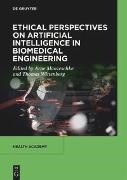Read more
About the author
Arne Manzeschke: Professor of Ethics and Anthropology, Director of the Institute for Nursing Research, Gerontology, and Ethics; Lutheran University for Applied Science Nuremberg. Training in Computer Science; Academic Studies in Theology and Philosophy in Munich, Tuebingen Erlangen-Nuremberg; President of Societas Ethica, European Society for Research in Ethics 2018–2021 Vice Chairman of the Ethics Commission on Preimplantation Diagnostics in Bavaria; Speaker of the Specialist Committee »Health Care Technology and Society« of DGBMT
Thomas Wittenberg: Chief Scientist at the Fraunhofer Institute for Integrated Circuits IIS, Erlangen; Lecturer (Privatdozent / Assistant Professor) at the Friedrich-Alexander-University Erlangen-Nürnberg , Department of Informatics.
Study of Computer Science at Christoph Newport College and Friedrich-Alexander-University Erlangen-Nürnberg, PhD in Biomedical Engineering & Habilitation in Computer Science, Friedrich-Alexander-University Erlangen-Nürnberg. Member of the Expert Committee of the DGBMT (German Society of Biomedical Engineering) and DGE-BV (German Society of Endoscopy)
Summary
Artificial Intelligence (AI) is currently considered as a disruptive technology. But there is more to be discussed than benefits and limitations of AI. The book delivers a closer look focused on the health care sector and biomedical engineering.
The first part provides introductory considerations from a historical, technical, legal and ethical perspective. The second part looks at artificial intelligence as a social phenomenon, while the third part provides social perspectives on the topic. It is important to us to consider AI not only as a technology and hence provide insight on this phenomenon. In the fourth part, artificial intelligence is presented with respect to applications in the addressed field of biomedical engineering. These cannot be covered exhaustively, but in such a way that a broad overview is provided and the relevant challenges are addressed. Finally, the last part deals with issues relating to the framework conditions and the regulation of AI.
In the “Contrapunctus”, the topic is once again viewed from a completely different, artistic angle. A position statement by the DGBMT on the topic of AI in biotechnology concludes the series of articles.

